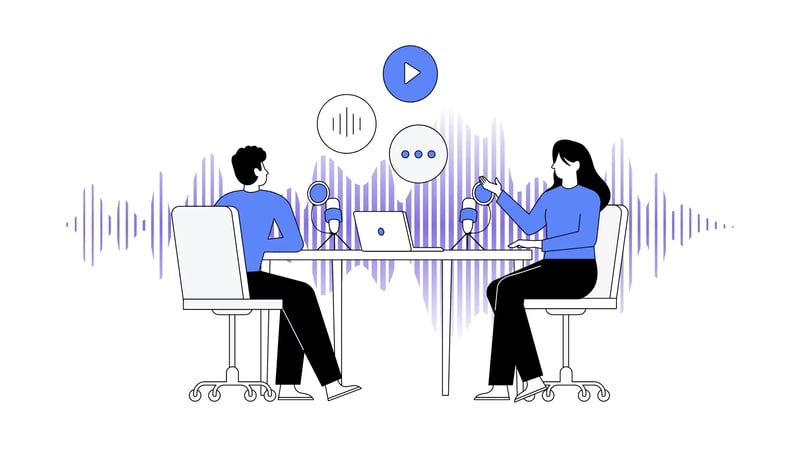The History of Podcasts: Then and Now
Podcasts have become popular in recent years, offering a universe of content accessible anytime, anywhere. But how did podcasts become the go-to entertainment and information source they are today?
In this blog, we'll dive into the captivating history of podcasts, from their quirky beginnings in the late 1990s to the powerhouse industry they are today.

The Early Days: 1930-2000
Before smartphones and sleek earbuds became ubiquitous, the seeds of podcasting were sown. In the 1930s, the concept of "radio with a future" began to take shape with the emergence of portable audio recorders. These early devices, while bulky and cumbersome, allowed people to capture sound on the go, paving the way for a more personalized listening experience.
Fast-forward to the 1980s, and the iconic Walkman hit the scene. This revolutionary gadget, coupled with the growing popularity of audiobooks and radio programs on cassette tapes, further fueled the desire for on-demand audio entertainment. People could finally choose what they listened to and when they listened to it, a concept that would become central to the podcasting revolution.
However, the true birth of podcasting can be traced back to the late 1990s, when a visionary named Adam Curry took center stage. Curry, a former MTV VJ, saw the potential for a new audio experience delivered directly to portable MP3 players, like the then-nascent iPod. He coined the term "iPodder" and envisioned a world where radio content could be downloaded and listened to at leisure.
A crucial puzzle piece was a technology called RSS (Really Simple Syndication). This allowed creators to publish audio files online and distribute them automatically to subscribers' media players. One of the first attempts at this new format was "Coffee Break with McGain" in 2000, a short, daily news show hosted by Rick McGain. Though early efforts were experimental, they laid the groundwork for the explosion of podcasting just around the corner.
The Golden Age of Podcasting: 2004-2010
The year 2004 marked a pivotal moment for podcasting. Apple entered the scene with the iPod Shuffle, a tiny device designed specifically for random music playback. This, coupled with the seamless integration of podcasts into iTunes, ignited a firestorm of interest. Suddenly, listeners could easily discover, download, and listen to podcasts on the go. The now-iconic "iPod: Rock Your World" ad campaign perfectly captured the energy and excitement surrounding this new medium, featuring silhouettes dancing to snippets of diverse podcasts.
This golden age witnessed the rise of content creators who would become synonymous with podcasting. Shows like "This American Life," known for its in-depth storytelling, captivated audiences with its unique blend of journalism and narrative. Meanwhile, groundbreaking investigative podcasts like "Serial" (though it wouldn't debut until 2014) paved the way for the true-crime genre's future dominance.
Comedy also found its footing in the podcasting world. Shows like "The Daily Show with Jon Stewart" podcast extended the hilarious commentary of the hit television program, proving that humor could thrive in the audio format. By the mid-2000s, statistics reflected the explosive growth of podcasting. According to a 2005 Pew Research Center report, the number of podcast listeners in the US alone had jumped to a staggering 22 million, a significant leap from the niche audience of the early days.
Monetization also began to take shape during this golden age. Podcasters started incorporating advertising and sponsorships into their shows, allowing them to generate revenue and potentially build sustainable careers. Early models included the ever-present "donate" buttons, allowing listeners to support their favorite shows directly. Additionally, some creators experimented with premium content, offering exclusive bonus episodes or ad-free listening for a subscription fee.
This era also saw the rise of dedicated podcasting platforms like Libsyn and Podbean. These platforms provided creators with tools for uploading, hosting, and managing their shows, streamlining the production process and making podcasting more accessible than ever before. With a growing audience, diverse content, and emerging monetization strategies, podcasting solidified its place as a force to be reckoned with in entertainment and information.
A Decade of Transformation: 2010-2020
The 2010s witnessed a seismic shift in how we consume media, and podcasting was no exception. The smartphone revolutionized accessibility, putting podcasting literally at our fingertips. Dedicated podcast apps streamlined the listening experience, allowing users to discover shows, subscribe to favorites, and download episodes for offline listening.
This convenience factor fueled a surge in mobile podcast consumption. According to a 2019 Edison Research report, a staggering 80% of podcast listeners in the US tuned in via their smartphones, a stark contrast to the early days of downloading episodes onto computers.
This decade also saw the rise of true crime as a dominant podcast genre. Shows like "Serial," which captivated audiences with its investigative deep dive into a single case, became a cultural phenomenon. Podcasts like "My Favorite Murder" added a dash of humor to the true-crime formula, proving the genre's versatility and broad appeal. These shows not only captivated listeners but also sparked discussions, documentaries, and even copycat crimes, reflecting their immense impact on popular culture.
However, the 2010s weren't just about established networks and big-budget productions. This era witnessed a decline in traditional media's dominance over podcasting. Independent creators, armed with readily available recording tools and online distribution platforms, began carving their own space.
The result? A vibrant explosion of niche genres. From deep dives into history and science to insightful business advice and hilarious comedy routines, there was a podcast for everyone. This diversification is further underscored by the sheer volume of content. By 2020, statistics indicated there were over 1.9 million active podcasts globally, a staggering testament to the medium's growth and the rise of the independent creator.
The Podcasting Landscape Today: 2020-Present
The podcasting boom continues to show no signs of slowing down. As of 2023, estimates suggest there are over 424 million podcast listeners globally, a testament to the medium's enduring popularity. This growth is further fueled by evolving trends like video podcasts and live recordings. Video podcasts, accessible on platforms like YouTube, offer a visual element to enhance the listening experience. Live recordings, meanwhile, allow for a more interactive experience, fostering a sense of community among listeners and creators.
Beyond entertainment, podcasting has become a powerful tool for businesses. Companies leverage podcasts for brand awareness, fostering deeper connections with their target audience. Engaging, informative podcasts can educate listeners about a brand's values, expertise, and products or services. This approach fosters trust and builds brand loyalty, ultimately leading to potential lead generation.
The concept of native advertising has also become increasingly sophisticated. Brands can partner with podcast creators to develop sponsored segments or even entire branded podcasts that seamlessly integrate with the show's content and tone. This allows for targeted messaging that resonates with listeners without feeling overly promotional.
Looking towards the future, innovation promises to further revolutionize the podcasting landscape. Artificial intelligence (AI) is making inroads, with the potential for AI-powered tools to assist with podcast creation and even generate personalized content recommendations for listeners. Additionally, interactive podcast experiences are on the horizon. Imagine being able to directly influence the narrative of a podcast or participate in live Q&A sessions with hosts - the possibilities are endless.
The journey of podcasts, from a quirky niche concept to a dominant force in the media landscape, is truly remarkable. With ever-evolving technology, innovative content creators, and a constantly engaged audience, the future of podcasting promises even more exciting developments, solidifying its place as a powerful tool for entertainment, information, and connection.
A Thriving Future for Podcasting
From niche beginnings, podcasts have blossomed into a dominant audio entertainment medium, offering a universe of content across diverse genres. Whether you crave true-crime investigations, insightful business advice, or side-splitting comedy routines, there's a podcast waiting to be discovered.
But the story doesn't end here. The future of podcasting is brimming with exciting possibilities. Artificial intelligence promises to streamline creation and personalize listening experiences. Interactive elements could transform podcasts into dynamic, choose-your-own-adventure journeys. This constant evolution ensures that podcasts will remain at the forefront of how we consume information and stories.
Understanding this historical context can be incredibly valuable for marketers. Podcasts harness the power of audio storytelling, fostering a unique intimacy and connection with listeners. By creating engaging, informative podcasts, brands can build trust, educate their audience, and ultimately generate leads.
Ready to delve into the world of podcasts? For those looking to leverage the power of podcasting in their marketing strategy, reach out to Aspiration Marketing! Our team of experts can help you develop a podcast that connects with your target audience and achieves your marketing goals.
This content is also available in:
- Die Geschichte der Podcasts: Damals und heute
- La historia de los podcasts: Antes y ahora
- L'histoire des podcasts : Hier et aujourd'hui
- La storia dei podcast: allora e oggi
- Istoria podcasturilor: înainte și acum
- 播客的历史:过去与现在









Leave a Comment